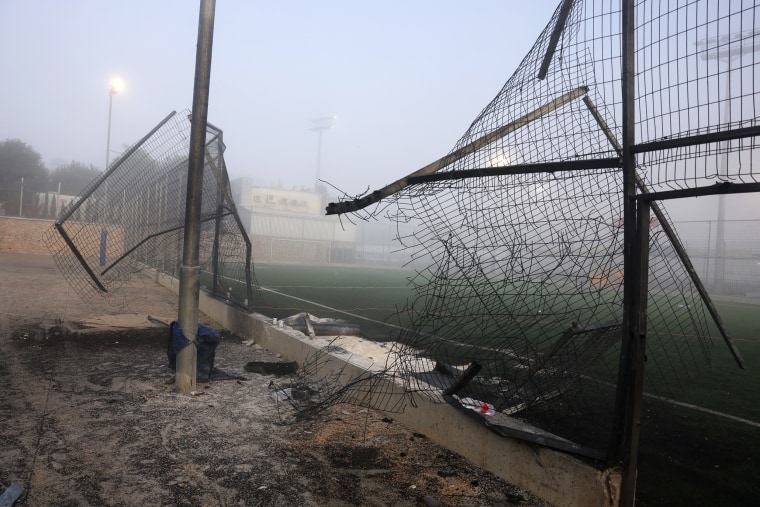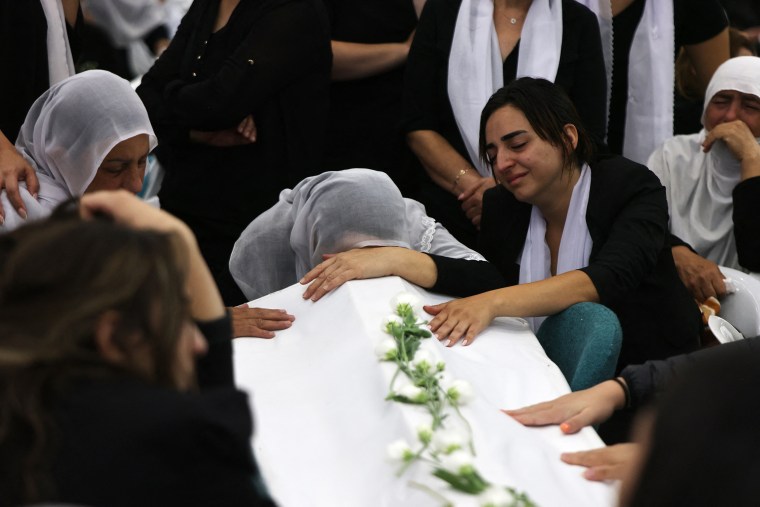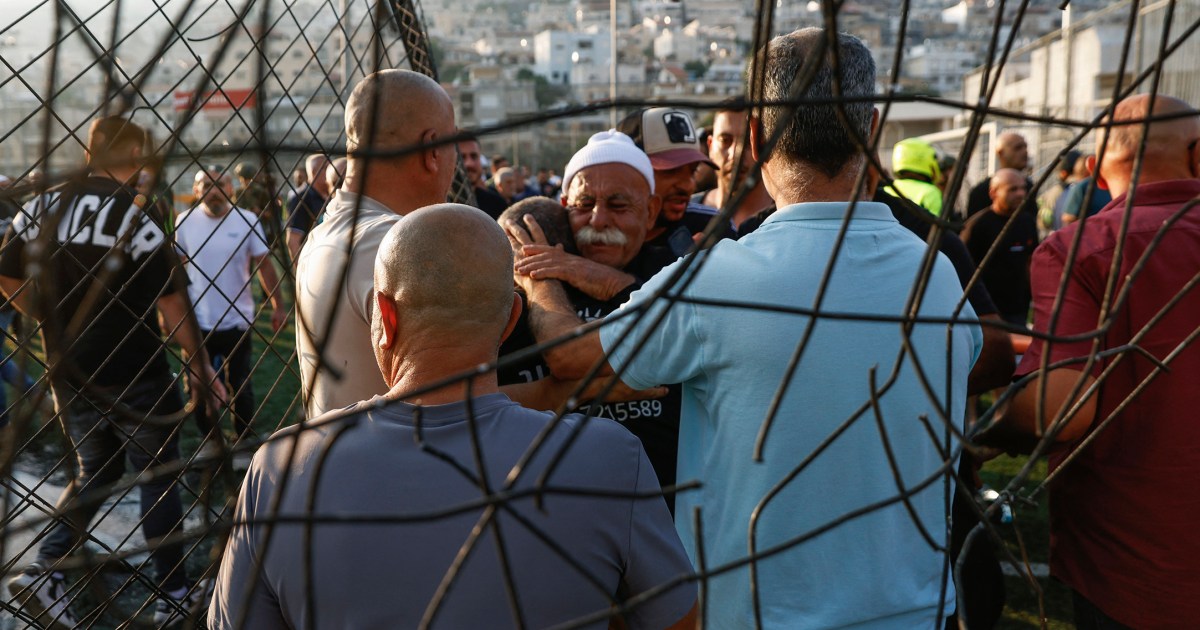MAJDAL SHAMS, Golan Heights — A single black flag of mourning and growing numbers of wreaths and bouquets mark the site where a rocket struck on Saturday night, killing at least 12, mostly children and teenagers, at a soccer field in Majdal Shams, an Israeli-controlled town in the Golan Heights.
A few yards away, the bikes and e-scooters the children and teenagers arrived on lay discarded, some of the frames pockmarked with shrapnel.
There is a bomb shelter just a few yards from the playing field, but residents said there wasn’t enough time to reach it. The sirens went off just moments before the blast.
The killings set off an exchange of retaliatory strikes that are heightening tensions between two heavily armed forces already locked in conflict.
The Israeli military said the attack on Majdal Shams was the deadliest strike on civilians in Israeli territory since Oct. 7. Prime Minister Benjamin Netanyahu rushed back to Tel Aviv from the United States as outrage built in Israel. “Israel is approaching the moment of an all-out war against Hezbollah,” the Israeli military said, blaming the attack on the Iran-backed militant group in Lebanon. “The IDF is prepared and ready to protect Israel’s security.”
“We are in an escalating war,” IDF spokesperson Rear Adm. Daniel Hagari said in a statement Saturday. “Children have been targeted, and those children are Druze Israeli citizens.”
By Sunday, the Israel Defense Forces said they had hit seven targets “deep inside Lebanese territory,” after Hagari said on Saturday that the military had evidence that the rocket that struck Majdal Shams was an Iranian-made Falaq-1 “owned exclusively by Hezbollah.”
Israel’s strikes hit as far as the Bekaa Valley, about 60 miles from Lebanon’s southern border with Israel, where hostilities had so far largely been confined. Hezbollah issued statements Sunday saying it had hit Israeli military positions in northern Israel “in response to the enemy’s aggression.”
Hezbollah has denied responsibility for the strike in Majdal Shams. It is unusual for the group to deny an attack, and in a series of statements issued on Saturday, Hezbollah did say it had struck nearby military targets in the Golan Heights. In one statement, Hezbollah claimed to have used a Falaq-1 rocket, the same munition Israel says hit the soccer field. However, the timings of the Hezbollah statements do not neatly align with the strike. Hezbollah said the Falaq-1 rocket was fired at 5:20 p.m. local time, while the IDF says Majdal Shams was hit at 6:18 p.m.
Speaking at a press conference in Tokyo, U.S. Secretary of State Antony Blinken said there was “every indication” that the rockets were from Hezbollah, adding that he was “deeply saddened” by the loss of life.

The strike landed just before sunset, and footage on Israel’s Channel 12 showed a large blast and a plume of smoke in one of the valleys in Majdal Shams, a town populated by the Druze, an Arabic-speaking ethnic and religious minority.
Sheikh Muafak Tarif, the spiritual leader of the Druze in Israel, decried “the brutal and murderous attack.”
“It’s impossible to imagine and describe the horrific images of children and their smashed [body] parts strewn on the grass,” he said in a statement.
About 25,000 Druze live in the Golan Heights, which Israel captured from Syria in 1967. It remains disputed, and much of the international community considers it to be Syrian territory occupied by Israel.
The conflict between Israel and Hezbollah has so far been subdued compared with its assault on Gaza. But Hezbollah’s promises of continued support for Palestinians has meant sustained attacks against Israel. Hundreds have died, mostly from Israeli fire in Lebanon, and tens of thousands have been displaced from their homes on both sides of the border.
The latest strikes have renewed fears of escalation.
“This is exactly the kind of thing that can send us into a spiral,” said Gershon Baskin, Middle East director of the International Communities Organisation based in Israel.
“Hezbollah is not going to take this sitting down, and their ability to do damage to Israel is 100 times bigger than Hamas,” Baskin said. “The amount of firepower that both sides have can do an enormous amount of damage and kill a lot of people.”
“Escalation is never planned. It spins out of control,” Baskin added.
The White House National Security Council said in a statement that support for Israel’s security “is iron-clad and unwavering against all Iranian-backed terrorist groups, including Lebanese Hezbollah.”
The U.S. has previously worked to prevent a greater war between Israel and Hezbollah from unfolding. On a trip to Lebanon in June, White House envoy Amos Hochstein said that the U.S. was urgently seeking to calm the conflict.
Despite pressure from the Biden administration, Israeli officials have remained firm in their desire to go after Hezbollah in Lebanon, according to U.S. officials familiar with the conversations.

Netanyahu cut his trip to the U.S. short by several hours following the strike on the Golan Heights. He immediately vowed retaliation against Hezbollah, and said the group would “pay a heavy price, one that it has not paid so far.” He arrived in Israel Sunday afternoon, according to the prime minister’s office, and was conducting a security situation assessment and a discussion with the political-security Cabinet.
The latest violence comes as Israel and Hamas are weighing a cease-fire proposal that could bring an end to the nearly 10-month conflict. On Friday, Netanyahu said he would send a delegation to Rome for talks aimed at ending the war with Hamas. The U.S. is sending the head of the CIA, Bill Burns, to meet representatives from Qatar, Egypt and Israel.
Hezbollah has said it will continue its attacks as long as Israel’s offensive in Gaza continues, and Fawaz Gerges, a professor of international relations at the London School of Economics, believes ending the war in Gaza would be the quickest way to put an end to any escalating conflict between Israel and Lebanon.
“Hezbollah has the capacity to resist Israel for years, not just months,” he said. “It could bleed Israel in ways that it has never experienced before.”
“Once the guns fall silent in Gaza,” Gerges said, “the clashes between Hezbollah, the Houthis and Israel will stop.”

